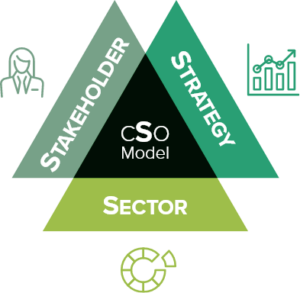The current landscape
At this critical early stage in the development of the sustainability function, we are observing the emergence of five discernible models* of CSO:
- 1. A CSO with a scope entirely focussed on climate related matters – a common model in large regulated organisations, where carbon metrics are more heavily reported on, and climate is the main focus of the sustainability agenda.
- 2. A CSO who blends corporate affairs with
sustainability – another common choice for regulated organisations, where sustainability is positioned as a critical external advocacy priority.
- 3. A CSO who blends marketing with sustainability – where businesses see sustainability as a growth or product opportunity, as we often see in technology companies.
- 4. A CSO who blends strategy with sustainability – more common in carbon-intensive industries and those whose businesses need to undertake significant Group-wide transformation in order to safeguard its future, such as oil and gas.
- 5. A CSO who blends legal with sustainability where there is a governance or reputational angle attached, particularly in carbon-intensive industries.
* Whilst there are other less common models, for example when looking at the asset management industry where the sustainability agenda is focussed on responsible investing, these five models are the most prevalent.
Learning lessons from past mistakes
As specialists in appointing functional leaders, Hedley May has witnessed the development of corporate functions over many years. It is very easy for a function to grow and, somewhat counterintuitively, become divorced from the bigger problems they are trying to solve. The larger the function the greater the tendency is to lean towards technical thinking over close and continuous alignment to the organisation’s core mission.
We have observed this most acutely with risk and compliance functions, where we saw leaders appointed predominantly with the focus of bringing technical expertise to the role. Once the ‘theory’ was set, these same teams struggled to embed the necessary change across the organisation. There is now a new wave of Chief Risk and Compliance Officers in place who have been hired to address the transformation and innovation deficit.
In appointing a CSO, the key is to bridge the capabilities you need to solve the problems of today with those you anticipate requiring in the future. Fundamentally, the CSO of the future must bring a combination of strategic judgment and the ability to drive change, innovate and transform. The blend of these leadership skills will be essential in driving the agenda forward and avoiding missteps.
When hiring a CSO, businesses that focus on hiring technical expertise that tackles the immediate issue or stakeholder challenge will find it harder to pivot to the issues of the – not so distant – future. Organisations must start thinking about the longer-term goals for the role and the function in order to put the right foundations in place – and that requires cross�business and cross-function input now.
Four Key Considerations
There are four key considerations for organisations when appointing a CSO and/or developing the sustainability function:
- 1. Accountability of ExCo: Sustainability is a cross-functional and cross-business problem. How will you ensure that all the ExCo stakeholders who need to be involved are involved, and are aligned to the success of the agenda?
- 2. Long-term strategic goals: Is there a clear mandate that a good CSO can deliver against? Have you defined the immediate priorities for the next two to three years, alongside having a perspective on what your organisation will need longer-term? Starting with the end goal in mind will help avoid some of the pitfalls, even if that goal changes as new information emerges and priorities change.
- 3. Technical vs leadership skills: Does the current skillset of your CSO or sustainability offering match up to what will be needed to drive this agenda in two years’ time – and if not, how will it need to develop? CSOs are in short supply – even more acute than with risk and compliance is the shortage of talent with relevant sustainability technical expertise. This means that the role of CSO is quickly becoming one of the most difficult functional positions to fulfil effectively. It is highly likely there will be gaps in leadership capability. Having clarity on these gaps at the outset and closely monitoring their impact is essential.
- 4. Reporting lines: Have you recognised the advantages and disadvantages of the current reporting line, and are you ready to move to a new reporting line if and when the cons outweigh the pros? The sustainability agenda cuts across a number of functions and businesses – it is unlikely that one reporting line alone, written in stone, will deliver.


